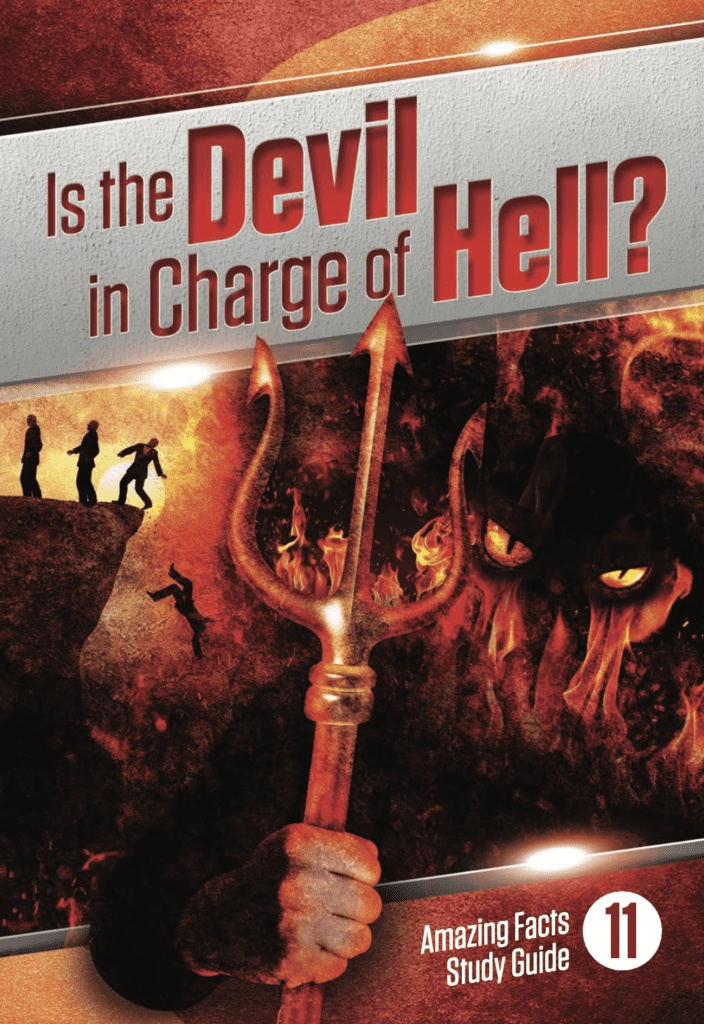 Lesson 11
Lesson 11

1. How many lost souls are being punished in hell today?
“The Lord knows how to deliver the godly out of temptations and to reserve the unjust
under punishment for the day of judgment” (2 Peter 2:9).
Answer: There is not one single soul in hellfire today. The Bible says that God reserves, or holds back, the wicked until the day of judgment to be punished.

2. When will the lost be cast into hellfire?
“So it will be at the end of this age. The Son of Man will send out His angels, and they will gather out of His kingdom all things that offend, and those who practice lawlessness, and will cast them into the furnace of fire” (Matthew 13:40–42).
“The word that I have spoken will judge him in the last day” (John 12:48).
Answer: The lost will be cast into hellfire at the great judgment at the end of the world—not when they die. God would not punish a person in fire until his or her case was tried and decided in court at the end of the world. Does it make sense that God would burn a murderer who died 5,000 years ago 5,000 years longer than a murderer who dies today and deserves the same punishment for the same sin? (See Genesis 18:25.)
3. Where are the unsaved who have already died?
“The hour is coming in which all who are in the graves will hear His voice and come forth—those who have done good, to the resurrection of life, and those who have done evil, to the resurrection of condemnation” (John 5:28, 29).
“That the wicked is reserved to the day of destruction? … Yet shall he be brought to the grave, and shall remain in the tomb” (Job 21:30, 32 KJV).
Answer: The Bible is specific. Both the unsaved and the saved who have died are in their graves “sleeping” until the resurrection day. (See Study Guide 10 for more information on what really happens at death.)

4. What is the end result of sin?
“The wages of sin is death, but the gift of God is eternal life in Christ Jesus our Lord” (Romans 6:23).
“Sin, when it is full-grown, brings forth death” (James 1:15).
“God … gave His only begotten Son, that whoever believes in Him should not perish but have everlasting life” (John 3:16).

Answer: The wages for (or the result of) sin is death, not everlasting life in hellfire. The wicked “perish,” or receive “death.” The righteous receive “everlasting life.”

5. What will happen to the wicked in hellfire?
“The cowardly, unbelieving, abominable, murderers, sexually immoral, sorcerers, idolaters, and all liars shall have their part in the lake which burns with fire and brimstone, which is the second death” (Revelation 21:8).
Answer: The Bible makes it clear that the ultimate fate of the wicked in hellfire is the second death. The idea of the wicked being eternally tortured goes against the concept of death, which means the cessation of life. If the wicked were eternally alive in hellfire, they would be immortal, contradicting the Bible’s assertion that only God possesses immortality (1 Timothy 6:16). The notion that sinners are immortal in hellfire is not rooted in biblical truth; in fact, it was originated by Satan. When Adam and Eve were expelled from the Garden of Eden, God placed an angel to guard the tree of life to prevent them from living forever in a sinful state (Genesis 3:22–24). This reveals that the eternal life God offers is meant for the righteous, not the wicked.

6. When and how will hellfire be kindled?
“So it will be at the end of this age. The Son of Man will send out His angels, and they will … cast them into the furnace of fire” (Matthew 13:40–42).
“They went up on the breadth of the earth and surrounded the camp of the saints and the beloved city. And fire came down from God out of heaven and devoured them” (Revelation 20:9).
“If the righteous will be recompensed on the earth, how much more the ungodly and the sinner” (Proverbs 11:31).
Answer: The Bible says that God will kindle hellfire. After the holy city comes down out of heaven (Revelation 21:2), the wicked will attempt to capture it. At that time, God will rain down fire from heaven upon the earth, and it will devour the wicked. This fire is Bible hellfire.

7. How big and how hot will hellfire be?
“The day of the Lord will come as a thief in the night, in which the heavens will pass away with a great noise, and the elements will melt with fervent heat; both the earth and the works that are in it will be burned up” (2 Peter 3:10).
Answer: Hellfire will be just as big as this earth because it will be the earth on fire. This fire will be so hot as to melt the earth and burn up all “the works that are in it.” The atmospheric heavens will explode and “pass away with a great noise.”

8. How long will the wicked suffer in the fire?
“Behold, I am coming quickly, and My reward is with Me, to give to every one according to his work” (Revelation 22:12).
“He will reward each according to his works” (Matthew 16:27).
“That servant who knew his master’s will, and did not … do according to his will, shall be beaten with many stripes. But he who did not know, yet committed things deserving of stripes, shall be beaten with few” (Luke 12:47, 48).
Answer: The Bible does not tell us how long the wicked will be punished before receiving death in the fire. God does specifically state, however, that all will be punished according to their deeds. This means some will receive longer punishment than others, based upon their works.

9. Will the fire eventually go out?
“Behold, they shall be as stubble, the fire shall burn them; they shall not deliver themselves from the power of the flame; it shall not be a coal to be warmed by, nor a fire to sit before!” (Isaiah 47:14).
“I saw a new heaven and a new earth. … And God will wipe away every tear from their eyes; there shall be no more death, nor sorrow, nor crying. There shall be no more pain, for the former things have passed away” (Revelation 21:1, 4).
Answer: Absolutely. The Bible explicitly teaches that hellfire will eventually be extinguished—there will be no ember left to warm by or fire to sit before. Furthermore, in God’s new kingdom, all former things will pass away, including hell. If God were to subject His enemies to eternal torture in a fiery chamber, He would be more cruel than even the worst human atrocities. An eternal hell contradicts God’s love for even the most sinful beings.

10. What will be left when the fire goes out?
“ ‘Behold, the day is coming, burning like an oven, and all the proud, yes, all who do wickedly will be stubble. And the day which is coming shall burn them up … that will leave them neither root nor branch. … You shall trample the wicked, for they shall be ashes under the soles of your feet on the day that I do this,’ says the Lord of hosts” (Malachi 4:1, 3).
Answer: Indeed, the Bible makes it clear that the wicked will be utterly consumed in the fires of hell, leaving nothing but ashes. Psalm 37:10 and verse 20 describe the fate of the wicked as going up in smoke and being completely destroyed. The imagery of burning like stubble emphasizes the complete and final nature of their destruction.

11. Will the wicked enter hell in bodily form and be destroyed both soul and body?
“It is more profitable for you that one of your members perish, than for your whole body to be cast into hell” (Matthew 5:30).
“Rather fear Him who is able to destroy both soul and body in hell” (Matthew 10:28).
“The soul who sins shall die” (Ezekiel 18:20).
Answer: Yes. Real, living people enter hell in bodily form and are destroyed both soul and body. The fire from God out of heaven will fall upon real people and blot them out of existence.

12. Will the devil be in charge of hellfire?
“The devil, who deceived them, was cast into the lake of fire” (Revelation 20:10).
“I turned you to ashes upon the earth in the sight of all who saw you. … You … shall be no more forever” (Ezekiel 28:18, 19).
Answer: Absolutely not! The devil will be cast into the fire, and it will turn him into ashes.
13. Does the word “hell” as used in the Bible always refer to a place of burning or punishment?
Answer: No. The word “hell” is used 54 times in the Bible (KJV), and in only 12 cases does it refer to “a place of burning.”
The word “hell” is translated from several different words with various meanings, as indicated below:
| IN THE OLD TESTAMENT 31 times from “Sheol,” which means the grave.” IN THE NEW TESTAMENT 10 times from “Hades,” which means “the grave.” 12 times from “Gehenna,” which means “the place of burning.” 1 time from “Tartarus,” which means “a place of darkness.” 54 TIMES TOTAL |
Note: The word “Gehenna” is a transliteration of the Hebrew “Ge-Hinnom,” which means the “Valley of Hinnom.” This valley, which lies immediately south and west of Jerusalem, was a place where dead animals, garbage, and other refuse were dumped. Fire burned constantly, as it does at modern sanitation dump sites. The Bible uses “Gehenna” or the “Valley of Hinnom” as a symbol of the fire that will destroy the lost at the end of time. The fire of Gehenna was not unending. Otherwise, it would still be burning southwest of Jerusalem today. Neither will the fire of hell be unending.

14. What is God’s real purpose in hellfire?
“Depart from Me, you cursed, into the everlasting fire prepared for the devil and his angels” (Matthew 25:41).
“Anyone not found written in the Book of Life was cast into the lake of fire” (Revelation 20:15).
“For yet a little while and the wicked shall be no more. … The enemies of the Lord … shall vanish. Into smoke they shall vanish away” (Psalm 37:10, 20).
Answer: God’s purpose is that hell will destroy the devil, all sin, and the unsaved to make the world safe for eternity. Any vestige of sin left on this planet would be a deadly virus forever threatening the universe. It is God’s plan to blot out sin from existence for all time!
Eternal Hell Would Perpetuate Sin
An eternal hell of torment would perpetuate sin and make its eradication impossible. An eternal hell of torment is not part of God’s great plan at all. Such a theory is slander against the holy name of a loving God. The devil delights to see our loving Creator pictured as a monstrous tyrant.
Eternal Hell Is Not Found in the Bible
The “eternal hell of torment” theory originated not from the Bible, but from misguided people who were, perhaps inadvertently, led of the devil. And while a fear of hell might get our attention, we are not saved by fear but by God’s grace.

15. Isn’t the act of destroying the unsaved foreign to God’s nature?
“ ‘As I live,’ says the Lord God, ‘I have no pleasure in the death of the wicked, but that the wicked turn from his way and live. Turn, turn from your evil ways! For why should you die?’ ” (Ezekiel 33:11).
“The Son of Man did not come to destroy men’s lives but to save them” (Luke 9:56).
“The Lord will rise up … that He may do His work, His awesome work, and bring to pass His act, His unusual act” (Isaiah 28:21).

Answer: Yes—the work of God has always been to save rather than to destroy. The work of destroying the wicked in hellfire is so foreign to God’s nature that the Bible calls it His “unusual act.” God’s great heart will ache at the destruction of the wicked. Oh, how diligently He works to save every soul! But if one spurns His love and clings to sin, God will have no choice but to destroy the unrepentant sinner when He rids the universe of the horrible, malignant growth called “sin” in the fires of the last day.

16. What are God’s post-hell plans for the earth and His people?
“He will make an utter end of it. Affliction will not rise up a second time” (Nahum 1:9).
“I create new heavens and a new earth; and the former shall not be remembered or come to mind” (Isaiah 65:17).
“Behold, the tabernacle of God is with men, and He will dwell with them, and they shall be His people. God Himself will be with them and be their God. And God will wipe away every tear from their eyes; there shall be no more death, nor sorrow, nor crying. There shall be no more pain” (Revelation 21:3, 4).

Answer: After hellfire goes out, God will create a new earth and restore it to His people—with all the beauties and glories of Eden before sin entered. Pain, death, tragedy, woe, tears, sickness, disappointment, sorrow, and all sin will be banished forever.
Sin Will Not Rise Again
God promises that sin will never rise again. His people will be filled with perfect peace, love, joy, and contentment. Their lives of complete happiness will be far more glorious and thrilling than mere words could ever describe. The real tragedy of hell is in missing heaven. A person who chooses not to enter this magnificent kingdom has made the saddest choice of a lifetime.
17. Are you thankful to learn that God is not punishing the wicked throughout eternity in hellfire?
Answer:
Thought Questions
1. Doesn’t the Bible speak of “eternal torment”?
No—the phrase “eternal torment” does not appear in the Bible.
2. Then why does the Bible say that the wicked will be destroyed with unquenchable fire?
Unquenchable fire is fire that cannot be put out, but which goes out when it has turned everything to ashes. Jeremiah 17:27 says Jerusalem was to be destroyed with unquenchable fire, and in 2 Chronicles 36:19–21 the Bible says this fire burned the city “to fulfill the word of the Lord by the mouth of Jeremiah” and left it desolate. Yet we know this fire went out, because Jerusalem
is not burning today.
3. Doesn’t Matthew 25:46 say the wicked will receive “everlasting punishment”?
Notice the word is punishment, not punishing. Punishing would be continuous, while punishment is one act. The punishment of the wicked is death, and this death is everlasting.
4. Can you explain Matthew 10:28: “Do not fear those who kill the body but cannot kill the soul”?
The word “soul” has three meanings in the Bible: (1) a living being, Genesis 2:7—(2) the mind, Psalm 139:14—and (3) life, 1 Samuel 18:1. Also, Matthew 10:28 refers to the soul as the eternal life that God guarantees to all who accept it. No one can take this away.
5. Matthew 25:41 speaks of “everlasting fire” for the wicked. Does it go out?
Yes. According to the Bible, it does. We must let the Bible explain itself. Sodom and Gomorrah were destroyed with everlasting, or eternal, fire (Jude 1:7), and that fire turned them “into ashes” as a warning to “those who afterward would live ungodly” (2 Peter 2:6). These cities are not burning today. The fire went out after everything was burned up. Likewise, everlasting fire will go out after it has turned the wicked to ashes (Malachi 4:3). The effects of the fire are everlasting, but not the burning itself.
6. Doesn’t the story of the rich man and Lazarus in Luke16:19-31 teach an eternal hell of torment?
No! It is a parable Jesus used to emphasize a certain spiritual lesson. The point of the story is found in verse 31. Parables should not be taken literally—otherwise, we would believe that trees talk! (See Judges 9:8–15.) Here are some facts making it clear that Luke 16:19–31 is a parable:
A. Abraham’s bosom is not heaven (Hebrews 11:8–10, 16).
B. People in hell can’t talk to those in heaven (Isaiah 65:17).
C. The dead are in their graves (Job 17:13; John 5:28, 29). The rich man was in bodily form with eyes, a tongue, etc., yet we know that the body does not go to hell at death but remains in the grave, as the Bible says.
D. People are rewarded at Christ’s second coming, not at death (Revelation 22:12).
E. The lost are cast into hell at the end of the world, not when they die (Matthew 13:40–42).
7. But the Bible speaks of the wicked being tormented “forever,” doesn’t it?
The term forever is used 56 times in the King James Bible in connection with things that have already ended.* It is like the word “tall,” which means something different in describing men, trees, or mountains. In Jonah 2:6, “forever” means “three days and nights.” In Deuteronomy 23:3, it means 10 generations. In the case of mankind, it means “as long as he lives” or “until death.” (See 1 Samuel 1:22, 28; Exodus 21:6; Psalm 48:14.) So the wicked will burn in the fire as long as they live, or until death. This fiery punishment for sin will vary according to the degree of sins for each individual, but after the punishment, the fire will go out. The unbiblical teaching of eternal torment has done more to drive people to atheism than any other invention of the devil. It is slander upon the loving character of a gracious heavenly Father and has done untold harm to the Christian cause.
*To check in a concordance, look up the word “ever.”
Quiz Questions
1. Sinners are cast into hellfire (1)
_____ When they die.
_____ At the end of the world.
_____ By the devil.
2. The reward that sinners will receive in hellfire is (1)
_____ Death.
_____ Eternal torment.
_____ Being tortured by the devil, who is in charge.
3. Hellfire (1)
_____ Will be the whole world set on fire by God.
_____ Is burning now.
_____ Burns throughout the endless ages of eternity.
4. Sinners who have died are in (1)
_____ Purgatory.
_____ Hellfire.
_____ Their graves.
5. The population of hell today (1)
_____ Is exactly zero.
_____ Numbers in the millions.
_____ Cannot be determined.
6. Hellfire (1)
_____ Destroys only the body of the wicked.
_____ Tortures the soul of the wicked throughout eternity.
_____ Destroys sinners -both soul and body- turning them to ashes, then goes out.
7. An eternal hell of torment (1)
_____ Is a very important part of God’s great plan.
_____ Is the devil’s doctrine and is slander upon the holy, loving name of God, who abhors seeing people suffer.
_____ Gives Satan a job throughout eternity.
8. “Hell” in the Bible (1)
_____ Always refers to a place of burning.
_____ Has several meanings, one of them being the grave.
_____ Refers to Satan’s subterranean torture chambers.
9. The purpose for hell is to (1)
_____ Pay back and torture God’s enemies.
_____ Frighten people into being good.
_____ Completely blot out sin and evil from the universe and make the righteous safe for eternity.
10. Destroying people in hell (1)
_____ Will be a delight to the great God of heaven.
_____ Is called God’s “unusual act,” because it is so foreign to His loving plan of saving people.
_____ Will be the devil’s job, in cooperation with God’s plan.
11. After hellfire goes out (1)
_____ God will banish Satan to far outer space.
_____ God will make a perfect new earth, where sin will never rise again, and give it to His people.
_____ The righteous will live in fear of sin’s rising again.
12. The story of the rich man and Lazarus (1)
_____ Is a parable and should not be taken literally.
_____ Is Bible proof for the teaching of eternal torment.
_____ Proves that souls in hell can converse with souls in heaven.
13. The term “for ever” as used in the Bible in reference to a man’s life (1)
_____ Means ‘time without end’.
_____ Is mysterious and cannot be understood.
_____ Usually means ‘a man’s lifetime’, or ‘until he dies’.
14. I am thankful to learn that God does not punish the wicked eternally in hellfire.
_____ Yes.
_____ No.



